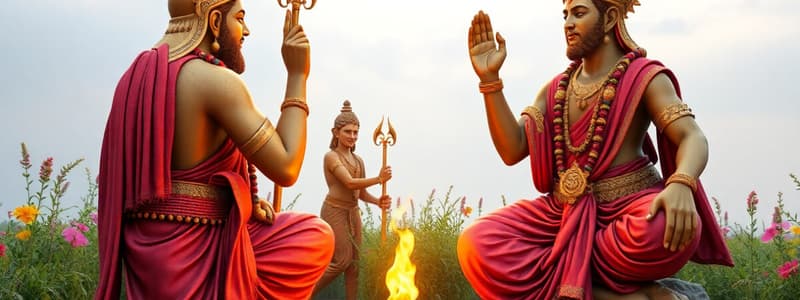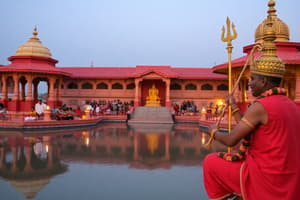Podcast
Questions and Answers
What is the belief of Hinduism regarding the eternal nature of truth?
What is the belief of Hinduism regarding the eternal nature of truth?
- Truth is subject to personal interpretation.
- Truth is eternal and absolute. (correct)
- Truth is only relevant in the material world.
- Truth changes over time with cultural shifts.
What does the concept of Dharma involve for Hindus?
What does the concept of Dharma involve for Hindus?
- It is not concerned with moral responsibilities.
- It is solely about achieving personal success.
- It encompasses both personal and eternal duties. (correct)
- It involves performing rituals exclusively.
What is Moksha in Hindu belief?
What is Moksha in Hindu belief?
- A state of eternal punishment.
- Freedom from the cycle of life and death. (correct)
- The physical form that the soul takes in reincarnation.
- A form of meditation leading to insights.
What is the significance of Karma in Hinduism?
What is the significance of Karma in Hinduism?
Which of the following is considered an immortal aspect of each individual in Hinduism?
Which of the following is considered an immortal aspect of each individual in Hinduism?
Which body of water is considered sacred in Hinduism?
Which body of water is considered sacred in Hinduism?
What is one of the four main aims in a Hindu's life?
What is one of the four main aims in a Hindu's life?
Flashcards are hidden until you start studying
Study Notes
Hinduism
- Hinduism believes in the eternal nature of truth.
- Brahman is the one world soul/god, with all other gods and goddesses being extensions of it.
- The Vedas are considered sacred texts in Hinduism.
- Hindus believe that there is a purpose for life on Earth – to find one's Dharma.
- All souls are considered immortal, and each soul possesses Atman, a connection to the universe.
- Karma represents the good and bad actions of a person in their current life and dictates their fate in the next.
- Hindus believe in reincarnation, also known as transmigration, where after death, the soul is reborn in a new body.
- Following one's Dharma, which is determined by Karma, leads to Moksha.
- The River Ganges holds sacred significance in Hinduism, and many Hindus make pilgrimages to it.
- Moksha is the liberation from the cycle of life and death.
- Dharma encompasses the duties a Hindu should follow in their life.
- There are various types of Dharma, including personal and eternal duties.
- Dharma is one of the four main aims in a Hindu's life.
Studying That Suits You
Use AI to generate personalized quizzes and flashcards to suit your learning preferences.




